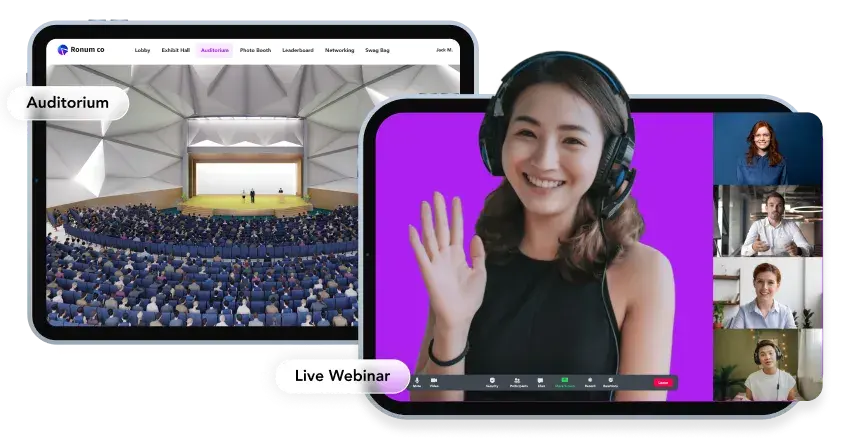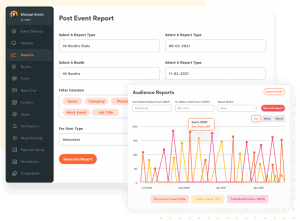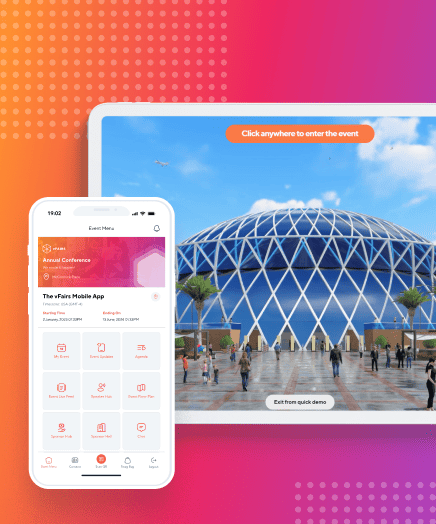Virtual events have emerged as powerful platforms that transcend geographical boundaries and connect communities. These digital gatherings offer networking, knowledge sharing, and engagement opportunities for the attendees.
Within the wide category of virtual events, the term webinar often takes center stage. Webinars have become synonymous with online learning, product demonstrations, and interactive presentations. But, is a webinar a virtual event or a standalone component? Let’s dig into this question.
What are Virtual Events?
A virtual event is a gathering that takes place digitally. Participants from different geographical locations come together to interact, learn, or collaborate using online platforms.
There is no such difference between digital and virtual, they are synonyms and refer to the online environment. Unlike physical events that require a physical presence at a specific location, virtual events unfold in the virtual space accessible through the internet.
These events leverage various technologies to replicate the experience of a traditional event, enabling participants to engage with content, speakers, and each other from the comfort of their homes.
Here are key aspects that define virtual events:
- Online Platform: Virtual events utilize online platforms, websites, or specialized software to host the event.
- Engagement Tools: Virtual events incorporate tools such as live or pre-recorded presentations, chat features, Q&A sessions, polls, and networking opportunities.
- Cost-Effectiveness: There are no venue rentals, travel expenses, or accommodation costs, making virtual events an attractive option for both organizers and participants.
- Global Reach: With the power of the internet, virtual events have a global reach. Attendees can come from various parts of the world, fostering diversity and inclusivity.
- Analytics and Data: Virtual event platforms offer data insights for organizers about participant engagement, content effectiveness, and event success.
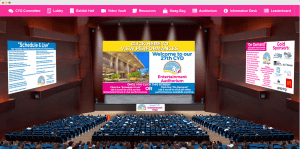
What are Webinars?
Webinars, short for web seminars, are specific virtual events designed for educational, informative, or collaborative purposes.
They blend the advantages of real-time interaction and multimedia presentations. Virtual webinars also allow participants to join from different locations virtually.
If you want to know what makes a good webinar, here are some features you need:
- Real-time Interaction: Participants can engage with the presenter and each other in real time, fostering a sense of immediacy and interactivity.
- Multimedia Presentations: Webinars often include slideshows, videos, and other multimedia elements to enhance the presentation and convey information effectively.
- Q&A Sessions: Webinars have dedicated time slots for Q&A segments for participants to ask questions from the experts after their talk.
- Chat and Networking: Many webinars include chat features for participants to communicate with each other, share insights, and network virtually.
- Recording and Reusability: Webinars are often recorded, allowing participants to revisit the content later or share it with those who couldn’t attend the live session.
The popularity of virtual event webinars has surged, especially in professional and educational settings. They offer a flexible way to disseminate information and facilitate meaningful interactions.
Webinar vs Video Conference – Are They the Same?
Although both are facilitated through online communication, the difference between a webinar and a video conference is their distinct purpose and structure.
Webinars are designed for one-to-many communication, focusing on presentations, lectures, or workshops where a speaker or panel shares information with a larger audience. Interaction in webinars is often moderated, with participants asking questions through designated channels, and hosts manage engagement tools like Q&A sessions or polls.
In contrast, video conferences are more interactive and suited for collaborative discussions among smaller groups. Participants in video conferences can actively engage in two-way communication, sharing screens, and files, and freely contributing to discussions.
So, Is a Webinar a Virtual Event?
No, a webinar is not a virtual event, but it can be a part of one. While a webinar can be an important aspect of a virtual event, a true virtual event is much larger in scale and is multi-purpose.
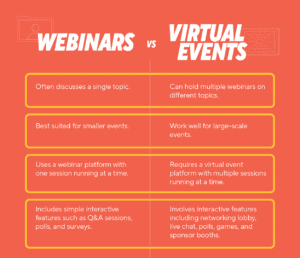
Virtual Event vs Webinar – The Differences
Now that we understand what a webinar is, let’s look at the key differences between virtual events and webinars.
1. Webinars Are Topic-Focused
A single webinar is focussed on one topic. If there is a virtual event hosting multiple webinars, they can have different topics but they usually follow a theme of the main event.
Cases where webinars can be held inside virtual events include open days, orientation sessions, and industry workshops. So, if there is a workshop being held virtually, and there are a few topics under discussion, then multiple webinars focused on each topic can be held inside this virtual event, with different speakers presenting them.

2. Virtual Events Offer More Networking Opportunities
The main aim of a virtual event is to create networking opportunities in an online setting but webinars primarily only focus on dispensing information.
In the case of virtual events, the participants can maintain a level of presence that is similar to what it would be like in person. They can move about the virtual environment in the virtual event platform and can interact with anyone available. The virtual environment can mirror a physical venue, and have interactive booths, gamification, roundtables, etc., making it a much more immersive experience.
Virtual events can be single or multi-day while webinars only last a few minutes or hours. The attendees usually don’t have networking opportunities beyond asking the speaker some questions, group chat, or taking part in live polls.
3. Virtual Events are More Customizable
Organizers can customize virtual events to match their event goals. There are multiple features to pick and choose from depending on what you want to achieve. For example, virtual events can support your sales and lead generation cycles much more efficiently than a simple webinar could, all thanks to features like:
- User Profile Search: You can search for attendees in the event who fit your target audience and book meetings with them.
- E-commerce Capabilities: You can start the sales process right from a virtual exhibit booth by adding a complete e-commerce module to your event with product listings and shopping carts.
- Document Hosting: You can upload brochures, spec sheets, videos, and more.
- User Data and Analytics: You can track performance and user journeys throughout your virtual event in real time.
- Email Marketing Campaigns: Virtual events often have post-event email marketing campaigns for quick follow-ups with leads.
- Polls and Surveys: Organizers can get instant feedback from the target audience by asking direct questions to potential leads in real-time.
4. Virtual Events Are Run Best Through a Virtual Event Platform
While webinars can be held over simpler tools, virtual events require a much more complex platform that makes all of the aforementioned requirements and design of a virtual environment possible.
For a virtual event to run smoothly, event space, lobbies, auditoriums, customizable booths, real-time collaboration, and live support is essential. The more the features, the better the experience for everyone involved.
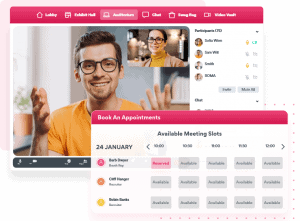
5. Virtual Events Offer More Data on Attendees
A notable advantage of virtual events is the ability to collect attendee data. Organizers can track attendees’ behavior and their interaction across various virtual booths. It gives an understanding of their interests and preferences. From chat functionalities to downloadable resources, organizers can gauge which elements the audience interacted the most with. This data-driven approach empowers event planners to optimize future sessions.
This functionality is limited in webinars. Here tracking participant engagement is often confined to the single presentation. There are only a few interactive features including the Q&A session, polls, or surveys.
6. Virtual Events can Host More Types of Content
While webinars primarily revolve around presentations and lectures, virtual events encompass a broader array of content types. Virtual events have content ranging from keynote speeches and panel discussions to interactive workshops and virtual exhibitions.
This diversity allows organizers to tailor the content mix to suit the preferences of the audience. Unlike webinars, which typically focus on a single speaker or a limited set of presenters, virtual events can host multiple sessions concurrently.

Final Verdict
In conclusion, a virtual event is best for scenarios where a lot of collaboration and interaction occurs. Where several companies or speakers are present at the same time. And there are many topics under discussion. Virtual events can take many days, and have a full agenda, and networking is an important aspect.
On the other hand, a webinar is preferable when there is a single topic of discussion for the seminar. Here attendees have a specific goal, which is usually to learn something new.
FAQs
What is a webinar event?
A webinar event is a scheduled online session that combines elements of a seminar with web conferencing technology. It involves a presenter or panel delivering content to a virtual audience.
Live vs Virtual events - What’s the difference?
events, involve attendees being physically present at a specified location with the seminar streamed live on their phones or the location. Virtual events occur online, enabling participants to engage remotely from the comfort of their own devices.



